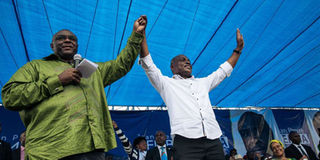One dead as DR Congo police break up banned marches

Movement for the Liberation of the Congo (MLC) leader Jean-Pierre Bemba (L) and former candidate of the Lamuka opposition coalition Martin Fayulu greet supporters who gathered for his rally as he returned to the DRC on June 23, 2019. PHOTO | ALEXIS HUGUET | AFP
What you need to know:
- Police and organisers said the man was shot at a banned march in Goma in the east to mark the 59th anniversary of the central African country's independence from Belgium.
- In Kinshasa, police used tear gas to break up another banned march and about 50 officers blocked a car transporting former presidential candidate Martin Fayulu and ex-prime minister Adolphe Muzito.
- Last Sunday, as opposition leader Jean-Pierre Bemba flew back into the country, police fired tear gas at rock-throwing protesters who targeted his convoy.
- Sunday's march was called by Mr Bemba and Mr Fayulu, who maintains he was robbed of victory in the country's December 30 presidential election.
KINSHASA,
A protester died after being shot at a march in Goma in the DR Congo Sunday as police dispersed hundreds of anti-government protesters in Kinshasa and President Felix Tshisekedi warned against "anarchy".
Police and organisers said the man was shot at a banned march in Goma in the east to mark the 59th anniversary of the central African country's independence from Belgium.
"One person seriously wounded by gunshot died in hospital," national police spokesman Pierrot Mwanamputu told AFP, while an opposition youth official said: "They fired real bullets."
Mr Mwanamputu said a policeman was wounded in the Goma unrest adding there was "resistance" to police efforts to disperse the marchers.
Provincial police commissioner Placide Nyembo told AFP some of the demonstrators were armed.
An opposition youth official, Robert Zibawanza, said some militants torched a commuter minibus.
TEAR GAS
In Kinshasa, police used tear gas to break up another banned march and about 50 officers blocked a car transporting former presidential candidate Martin Fayulu and ex-Prime Minister Adolphe Muzito.
An AFP journalist saw police using bayonets to puncture three of the car's tyres.
The two men emerged from the car to talk to Kinshasa police chief Sylvano Kasongo as some demonstrators tried to group around them.
On Saturday, President Tshisekedi said he backed a decision to ban the march planned by his former opposition comrades, pointing to violence that broke out last weekend.
"ANARCHY"
Speaking in his first major interview since taking office early this year, Mr Tshisekedi -- son of opposition icon Etienne Tshisekedi -- told French media: "We have the impression that there are some who confuse democracy with anarchy."
He vowed there would be "no repression", asserting that: "The security forces are trained to keep the peace."
Last Sunday, as opposition leader Jean-Pierre Bemba flew back into the country, police fired tear gas at rock-throwing protesters who targeted his convoy.
Before being elected President, Mr Tshisekedi inherited the mantle of opposition leader from his father Etienne, who died in February 2017.
WARNING
Sunday's march was called by Mr Bemba and Mr Fayulu, who maintains he was robbed of victory in the country's December 30 presidential election.
Their Lamuka coalition said late Friday it would go ahead with the march to protest the constitutional court's invalidation of the election of about 20 opposition lawmakers.
Mr Kasongo had warned that any gatherings of more than 10 people would be dispersed.
On Sunday, he said there had been "no major incidents" in Kinshasa where "all those arrested were immediately released" apart from one protester who remains in detention for "attacking and wounding" a police officer.
"PUPPET"
Mr Fayulu, 62, accuses Mr Tshisekedi of being the "puppet" of his predecessor Joseph Kabila, whose party enjoys a majority in Parliament.
A former vice president, Mr Bemba ran unsuccessfully for the presidency against Mr Kabila in 2006.
He was then jailed by the International Criminal Court based in The Hague for alleged atrocities carried out by his troops in the Central African Republic.
But he was finally acquitted and freed on appeal in June 2018, when he returned to Belgium.
Protests were also reported in the western city of Bandudu, the fief of both Mr Fayulu and Mr Muzito.





